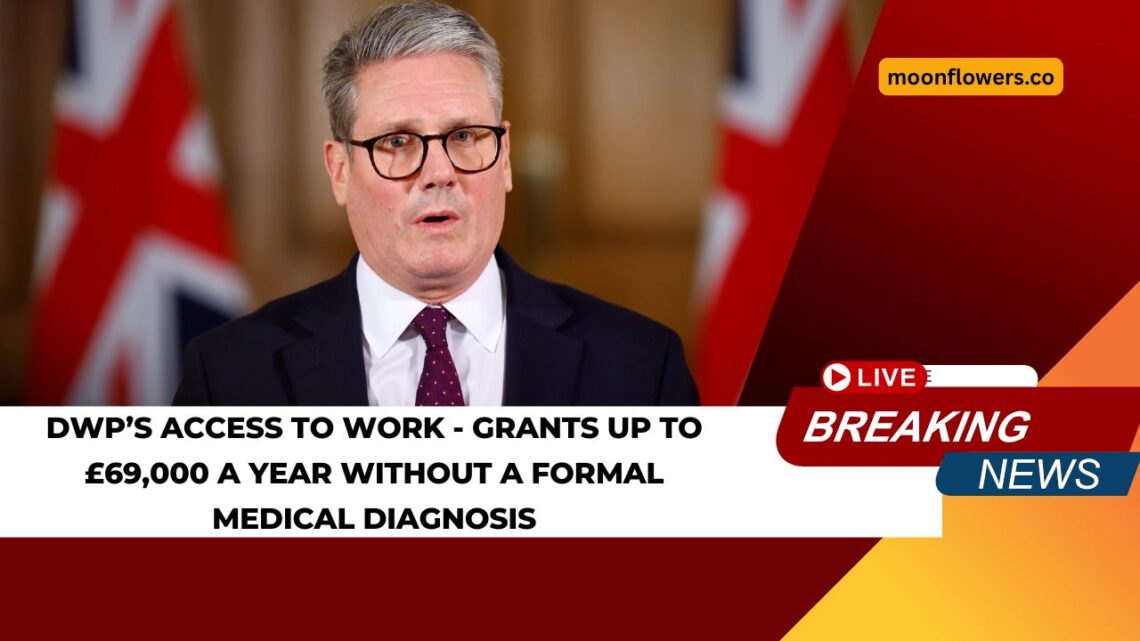The Department for Work and Pensions (DWP) runs the Access to Work scheme, a government initiative designed to help people with disabilities or health conditions stay in employment.
Offering grants of up to £69,000 a year, the scheme covers a wide range of support needs — and crucially, applicants do not need a formal medical diagnosis to qualify.
This unique approach has drawn attention, sparking debate about accessibility, accountability, and the balance between providing support quickly and preventing misuse.
Key Features of the Access to Work Scheme
| Feature | Details |
|---|---|
| Maximum Grant | Up to £69,000 per year |
| Diagnosis Requirement | No medical proof required; judged on impact of condition on work |
| Eligible Conditions | Physical disabilities, mental health conditions, learning difficulties, developmental disorders, temporary impairments |
| Age Requirement | Available for anyone 16+ in paid work |
| Geographic Coverage | England, Scotland, and Wales (different scheme in Northern Ireland) |
| Support Provided | Specialist equipment, workplace adaptations, interpreters, job coaches, travel costs, interview assistance |
| Exclusions | Does not cover reasonable adjustments employers must provide by law |
Who Can Apply?
The scheme is open to anyone aged 16 or over who is in paid work, about to start a job, or self-employed. It covers full-time, part-time, temporary, or permanent positions.
Applicants simply need to demonstrate how their condition affects their ability to work rather than providing medical certificates. This ensures faster access, especially important given long waiting lists for official medical assessments.
How the Process Works
When someone applies, an Access to Work adviser contacts them to discuss their needs. The adviser may consult the employer, review the job role, or carry out a workplace visit to assess adjustments required.
Based on this, the applicant receives a written decision detailing the grant amount and how it can be used.
The funding can cover:
- Assistive technology or specialist software
- Adaptations to offices, vehicles, or home working setups
- Travel support if the person cannot use public transport
- Sign language interpreters or job coaches
- Help during interviews
Grants are usually paid as reimbursements, requiring claimants to provide invoices and receipts. Importantly, this support is separate from other benefits and does not need to be repaid.
Rising Demand and Costs
Demand for Access to Work has surged in recent years. The number of people supported rose by more than 80% in just two years, jumping from around 37,000 in 2021–22 to over 67,000 in 2023–24. Spending increased from £149.9 million to £257.8 million in the same period — a 72% rise.
Forecasts suggest that by 2029–30, the programme could support around 84,000 people annually, with costs projected to climb to over £700 million.
The average award per person is expected to increase from about £6,600 in 2023–24 to £8,500 by the end of the decade.
Supporters vs Critics
The no-diagnosis rule is both the scheme’s strength and its controversy.
- Supporters argue it prevents delays for applicants stuck on medical waiting lists, ensuring that people who genuinely need help can receive it quickly. They stress that every application undergoes assessment, meaning money is not simply handed out without checks.
- Critics worry the lack of mandatory medical proof could leave the system open to abuse, particularly with such large sums at stake. Rising demand and costs have also raised questions about sustainability and the need for tighter safeguards.
The government maintains that Access to Work is kept under review to ensure value for taxpayers while continuing to provide essential support.
The Access to Work scheme is a cornerstone of workplace inclusion in the UK, enabling thousands of people with disabilities and health conditions to remain in or return to employment. Its flexibility — especially the lack of a medical proof requirement — helps cut red tape and speed up support.
However, with demand rising and costs projected to triple by the end of the decade, the scheme faces growing pressure to balance accessibility with accountability. For now, Access to Work remains a vital tool in building a fairer and more inclusive labour market.
FAQs
Do I need medical proof to apply?
No. A formal diagnosis is not required. Applications are judged on how your condition affects your ability to work.
How much funding can I receive?
You may be eligible for up to £69,000 a year, although the average award is significantly lower.
What types of support does the scheme cover?
It can fund assistive technology, workplace adaptations, interpreters, job coaches, commuting support, and help with job interviews.
